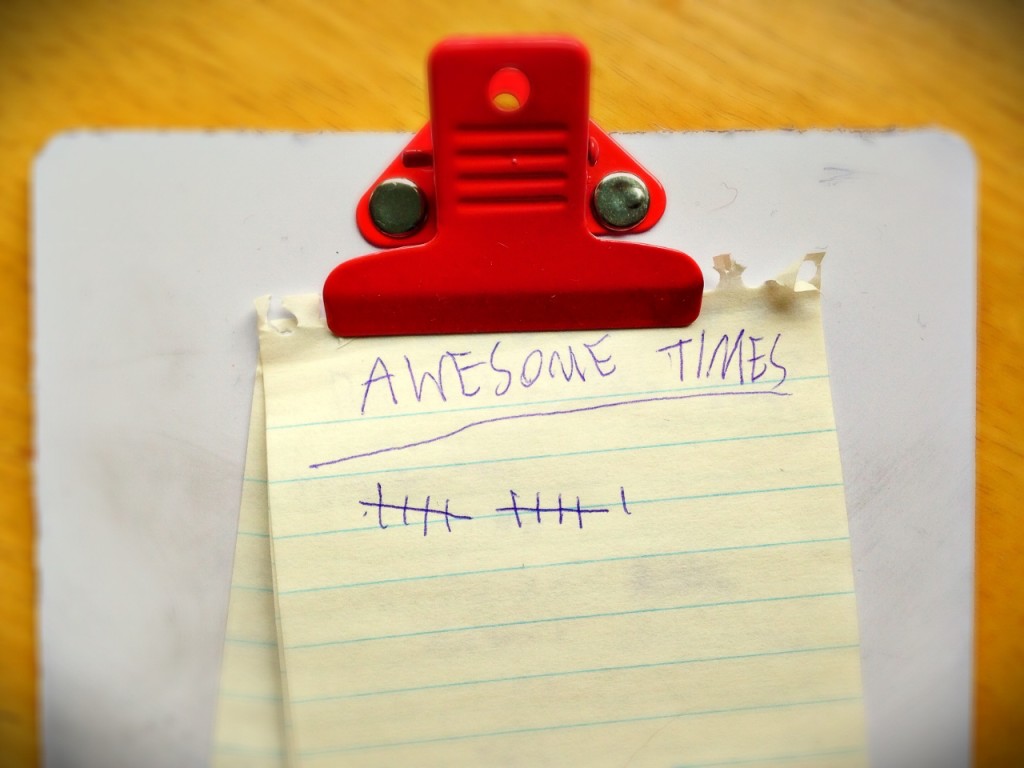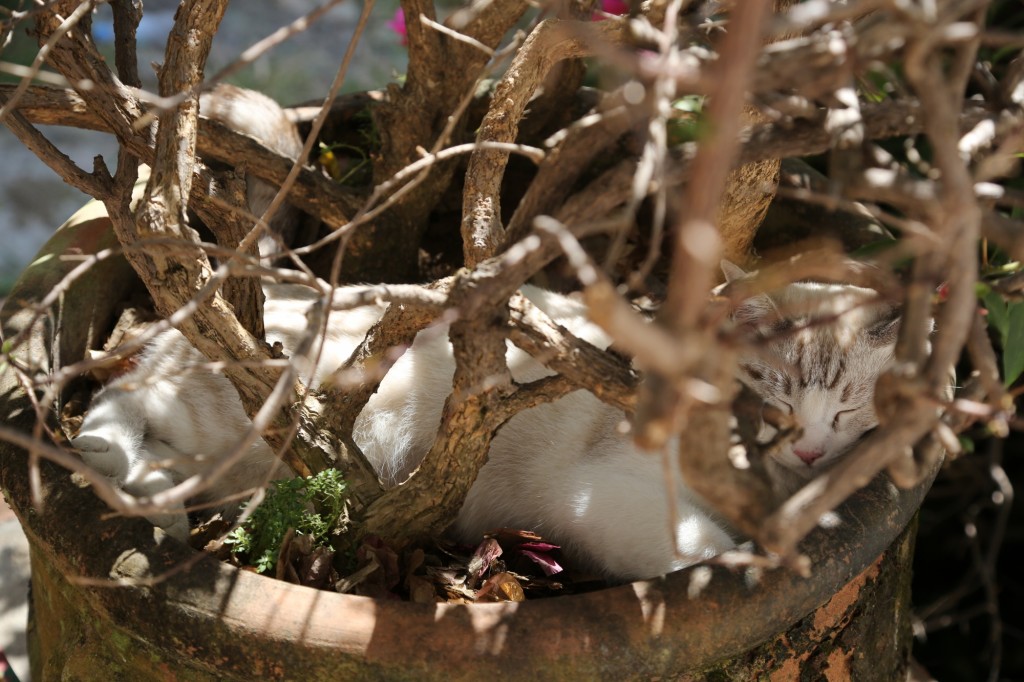
By Jamie Passaro
My girls like rocking out in the car to “Uptown Funk,” “Shake It Off,” “Insane in the Membrane.” One knows all the bad words now, the other still mispronounces the same words she did as a toddler, her Rs coming out, adorably, like Ws. I worry, worry, worry about them as much as I try to enjoy them and remember how fleeting this all is. I want for them to experience some kind of unorchestrated magic in this life.
When she was alive, my Mom used to complain every year at Christmas that she wasn’t feeling it, wasn’t feeling the magic like she used to. It used to annoy me—why couldn’t she just feel it?—but now I get it. I’m rushing too much. I want it to be all home-made snowflakes and fresh-baked sugar cookies for the girls, for me. But my to-do list is long, my grocery bags so heavy, and I don’t have a plan for Christmas cards yet. It’s not magic, it just is.
I read about this scientist who studied serendipity, that crazy pleasant insight or experience that can happen when you wander off script. She classified people into three categories, from those who were most likely to find happy surprises—the meandering super-encounterers, to those who were least likely, the boring, to-do list-bound non-encounterers. And even though I sound pessimistic and unfun and may be exaggerating a tiny bit to make a point when I say this, it seems to me that many of the skills related to good parenting place me in the latter category.
When you get up each day and say this is how the day is going to go and then your day goes that way, you’re not going to find much magic. And yet, as parents of young children, that’s kind of what we have to do—to measure out our days in routines and activities and downtimes to achieve maximum happiness and flow as opposed to crankiness and someone chucking her bike helmet from the back of a moving bike. It sounds mechanical, but it’s absolutely prophetic.
For those of us who are hard-wired to move through our days with a semblance of organization, to wake up and say, Today I will soak the beans and finish the scarf and write the thank you’s, well, having kids sort of reinforces that tendency. Their nourishment and well-being depends on your ability to keep their dresser drawers in seasonal clothes and to get the burritos on the table at a relatively similar time each day. Which is funny, really, because most kids I know don’t move through their days like structured beings at all. They stop to read every word of the signage and inspect pebbles and stuff oak galls in their pockets and build homes for baby snails. They resist rush in the most wondrous and infuriating ways.
How we let our stories and theirs write themselves while also keeping everyone on some kind of schedule is maybe the best flow. As we hunker down in the grayest, rainiest of indoor months here in Oregon, I find that the most difficult. Wintertime, especially where we live in the Northwest, is when we settle most into our routines.
Sure, it’s easy to be spontaneous in summer or on a vacation. But in winter, I know what our days will be like. There will be card games and mancala and lentil soup. There will be a couple of trips up to the snow, where we will forget something, where we’ll be ill-equipped for the wet cold, and then a damp ride in the car back to Eugene, with our lukewarm cocoa and the girls falling asleep in the safe womb of our rattly minivan. In February, I will desperately Google discount flights to Mexico.
One of my favorite people is my friend Diane, a true super-encounterer. I lived with her during the summer of 1995 while I interned at a small newspaper on Whidbey Island. Diane was in her fifties then, splashed her face with a little rose water every morning, wore charcoal eyeliner, and cut-off shorts, Birkenstocks. She always had red wine on hand, toasted with every fresh glass, quoted Shakespeare, ate chips and salsa for dinner, let the chickens come in the house, which was comfortable, full of dusty children’s art, dog hair, sand everywhere.
I’d never known a free spirit before, but I was drawn, and whatever parts of me that leaned that way were magnified, justified, made sense. Diane’s a vegetarian—a very persuasive one—and so I became one. I wore a batik dress and every morning I gathered the chickens’ eggs in its folds. I took the two unruly dogs to the beach, bought wine and loaves of bread from the Star Store, kissed the reporter from the local alternative paper, listened attentively to Diane’s many, many stories involving serendipity and new friends. Diane and I walked the beach downtown one night to the Clyde Theater to see “Muriel’s Wedding,” which we thought was hilarious. On the way back, the tide had come in, so we had to wade, waist-deep, all the way home. We sang ABBA in the moonlight, and I don’t think I have ever been so happy.
Even meeting Diane was serendipitous. I had applied for an internship at her local paper because I’d been turned down for a more coveted internship in a city that I loved. After moping around in my college apartment for a few days, I applied to Whidbey on a whim, thinking it might be soothing to sleep on an island for a summer. After I got the job, a columnist for the paper told me about her neighbor Diane, who needed a roommate for the summer, and then I found her eating chips and salsa and drinking wine on her sun-soaked back deck with a friend.
I met my husband around then—also serendipitously—and I think he’s sometimes disappointed that I’m not that long-haired girl anymore. Sometimes, I am, too. When I’m on Facebook too much or rushing the girls through errands or spotting a conflict on our calendar that’s three weeks away.
I’ve been trying to remember one of the things found by that the scientist studying serendipity. You can cultivate the magic. You can actually train yourself—and hence your kids—to notice more: to read the appendix or investigate the birds hanging out in the branches of the tree in the parking strip. Or maybe you get small doses of unexpected joy in a mixed tape, a snow day, a Goodwill find. That tall Dad getting down to bhangra in the elementary school gym at the diversity conference—just totally letting go amid a sea of kids and moms. That time when I was passing through Portland and called an old friend to see if she could recommend a family- friendly brew pub in the neighborhood where I was lost and she said, “I’m at a family-friendly brew pub in that neighborhood right now.” A small serendipity, for sure, but if I hadn’t been lost, if I had Mapquested my way through my trip as I sometimes do, I wouldn’t have spent a fun afternoon with my friend.
My girls love a road trip just about as much as I do. They seem to recognize that it means anything is possible, like ice cream in the middle of the day or gum balls at the rest area or pooping in a field of wildflowers. They’re still talking about the time we hung out on a beach in Northern California and when we went to fly our kite and a crow stole some of our picnic bread. We’d also seen the Redwoods that day and had rolled up our pants and jumped in the waves, but that crow is what they talk about when they talk about that trip.
And so, waking up from our winter slumber two years ago, the girls and I got a three-week housesitting gig in San Francisco. We were to watch two dogs, three cats, and four chickens who resided at a bungalow in the Outer Mission. We took our friends Chloe and five-year-old Lucien with us, and we drove all night to get there. The house was smallish, dusty, full of children’s art and games, familiar.
The trip was tough sometimes, especially synchronizing our different parenting styles, and glorious other times: dim sum in a big ballroom, a butterfly exhibit in Golden Gate Park, listening to one of my favorite bands play a concert in an old mortuary, marching the kids up and down hills in search of another park or mural, another ice cream shop. Once I found myself caught in the rain with all three kids as we walked up Mission Street looking for a bus stop. I don’t know why, but they decided to pound on the plate glass window of a wig shop and they wouldn’t stop. The shopkeepers came out and scolded them but they continued to pound more and more riotously until I bribed them with pie, which was very good and gave us a place to rest and for them to poop—the triple public restroom poop being an excruciating specialty of theirs when we were out and about. Our days in San Francisco were like that; there was something wonderful every day and something difficult, or three dozen difficult things.
Not surprisingly, we went a little off the rails. One morning we took the bus to the Gay Pride parade, but it was so crowded that we couldn’t see much of anything—a few rainbow wigs, the back of Nancy Pelosi’s head. After an hour or so, the kids, who’d been promised thrown candy and trinkets, revolted. There was a little scene on the sidewalk where a glass bottle was thrown precariously close to someone’s head. Chloe and I couldn’t agree on a plan and so we split up for the rest of the day. We were all tired, I think, worn out from so many different days, so much wonderful.
At the house in the Outer Mission, we left behind a broken plant pot, a torn curtain, a clogged drain, and a garbage bag full of the siding the dogs have gnawed off of the house. It had been a challenging and surprisingly cold and damp few weeks; I’d gotten three parking tickets. But the next spring, I contacted the homeowner to see if she wanted us back.
•••
JAMIE PASSARO’s articles, interviews, and essays have been published in The New York Times, theatlantic.com, The Sun, Utne Magazine, and Oregon Humanities Magazine, among other places. Her last essay for Full Grown People was “A Mild Suspension of Effort.”

 Follow
Follow
